| Srl | Item |
| 1 |
ID:
157142


|
|
|
|
|
| Summary/Abstract |
The development of EU space policy and its two main programmes, Galileo and Copernicus, has necessitated a parallel process of legitimization of this policy. Popularization, defined as the simplification of a policy in order to be made accessible to the masses and accepted by them, has been a core legitimising tool in the hands of the European Commission, with regular help from experts/industrialists, or ‘organic intellectuals’. After establishing popularization conceptually, the analysis illustrates instances of both expert-based and non-expert-based popularization at the Brussels level. It concludes that the process of popularization conceals the most controversial aspects of both Galileo and Copernicus while also producing a ‘general interest’ that glues together a disparate set of social forces, in favour of EU space programmes and their manufacturers - the European space industry.
|
|
|
|
|
|
|
|
|
|
|
|
|
|
|
|
| 2 |
ID:
052534
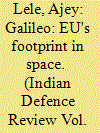

|
|
|
|
|
| Publication |
Apr-Jun 2004.
|
|
|
|
|
|
|
|
|
|
|
|
|
|
|
|
| 3 |
ID:
054068
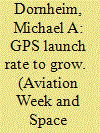

|
|
|
| 4 |
ID:
064769
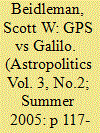

|
|
|
| 5 |
ID:
058905


|
|
|
|
|
| Publication |
Oct-Dec 2004.
|
|
|
|
|
|
|
|
|
|
|
|
|
|
|
|
| 6 |
ID:
093894
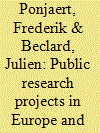

|
|
|
|
|
| Publication |
2010.
|
| Summary/Abstract |
The projects discussed in this paper, Galileo and ITER, are two contrasting experiences of Euro-Asian cooperation within Very Large (Public) Scientific Enterprises. They offer key insights into the deepening relations which have given shape to the rapidly expanding field of Euro-Asian collaborative interregional projects. Cooperative agendas within such "Big Science" endeavors heighten the question of the political considerations supporting the decision to engage specific forms of international cooperation. As the main driving force behind both projects, the EU's choices have resulted in the establishment of novel and distinct forms of Euro-Asian scientific cooperation. A better understanding of how such Euro-Asian initiatives emerge can logically be garnered by confronting the Euro-Chinese cooperation within Galileo, and the Euro-Japanese partnership within ITER. This comparison will show that the agendas and institutions of these two interregional policies vary greatly. Within the same policy field - in casu Large Scientific Projects - and in relationship to the same region - i.e. East Asia - this study shows that fundamentally different policies are practiced side-by-side. If in both cases Euro-Asian scientific cooperation has provided its participants with renewed leverage and unprecedented opportunities, the exact scope and function of these interregional collaborations range from the merely tactical in the Euro-Chinese Galileo experience, to the substantial in the Euro-Japanese ITER experience.
|
|
|
|
|
|
|
|
|
|
|
|
|
|
|
|
| 7 |
ID:
113035


|
|
|
|
|
| Publication |
2012.
|
| Summary/Abstract |
This paper traces the way in which the European Commission has framed and reframed the issue of EU satellite navigation over 20 years. It investigates how the EU's agenda-setter has 'talked about' space policy, with a particular focus on Galileo, and how its own institutional discourse - as revealed in its communications throughout the agenda-setting stage of Galileo's 'definition' phase - evolved in the 1990s through the use of 'frame sets'. In so doing, it illustrates the ways in which, over time, the EU's executive has 'projected' the issue of independent satellite navigation capabilities as being politically and economically desirable for Europe, and has sought to persuade decision makers of its cross-policy relevance and potential economic, social and security benefits. The article deconstructs official documents and engages in a close-up analysis of policy formulation, to identify nascent, evolving and mature frames in the definition of Galileo.
|
|
|
|
|
|
|
|
|
|
|
|
|
|
|
|
| 8 |
ID:
113037
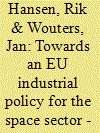

|
|
|
|
|
| Publication |
2012.
|
| Summary/Abstract |
The rise of the EU as an actor in the European and world space theatres, in its various roles as initiator, owner and operator of large-scale programmes such as Galileo and GMES, has raised a number of questions with regard to industrial policy. Based on the experiences from the Galileo programme's procurement round in the Full Operational Capability (FOC) phase and on the present discussions on space industrial policy within the EU, this paper argues that, whereas the EU's political ambitions in space have been discussed and become reasonably well defined, the specific policy tools and legal instruments to put them into practice are far from complete. First, an unequivocal industrial policy for the space sector needs to be defined that reconciles the Union's political ambitions with the economic specificities of the space sector. At present, this is a work in progress, with opinions diverging between member states. Second, both logically and temporally, these policy decisions need to be translated into legal instruments that allow their implementation. This implies the development of made-to-measure funding instruments and procurement rules. We conclude by emphasising the need for a sector-specific industrial policy as an integral part of the EU's space policy.
|
|
|
|
|
|
|
|
|
|
|
|
|
|
|
|
| 9 |
ID:
122308
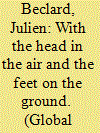

|
|
|
|
|
| Publication |
2013.
|
| Summary/Abstract |
Starting with the assumption that the European Union has increasingly tended to present its major space achievements as a substantial contribution to a larger and more ambitious project of construction and legitimization of a political actor (common foreign and security policy/European security and defense policy), this study deals with the EU's international actorness regarding global space governance. Different criteria (authority, autonomy, and coherence) have been selected in order to measure the level of international actorness in a given sector. This original grid of analysis has been systematically tested on the EU in order to conclude if the EU is an actor in the space field or if it is simply present in the field.
|
|
|
|
|
|
|
|
|
|
|
|
|
|
|
|